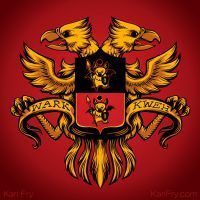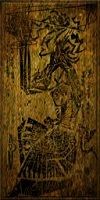From vanilla
Morrowind:
herd animals wrote:The two most common herd animals of the Ashlanders are the guar and the shalk. The guar is a large biped, trained as a beast of burden, and raised for meat and hides. Wild guard[sic] are encountered in the wilderness; they're usually quite peaceful. The shalk is a large, unaggressive[ha!] beetle, raised for meat and resin from its shells.
First of all I ought to mention that my knowledge of these matters is very shallow. Caribou/reindeer are however, for instance, animals that are both migratory and have been domesticated to greater and lesser extents, by the Sami among others, including being used for meat, hides and transport. Actually, I'd have thought there were quite a few such examples; Bactrian camels, some of the wilder horse breeds, etc.
One of the real-world comparisons people make of the Dunmer is to the Israelites, and certainly Morrowind takes heavy inspiration from the fertile crescent; I don't think it would be unreasonable to compare shalk and guars with goats and camels. (Note the
packs in particular).
As far as the Ashlanders are concerned, I'd always felt the more obvious comparison was with the Eurasian steppes as opposed to the Plains Indians, though naturally as opposed to either they don't appear to make (significant) use of mounts. (A large part of this is due to gameplay, no doubt; I've pointed out before that there's a large intact siltstrider shell in the middle of each camp except, I think, for Ahemmusa, which has fallen on hard times, which goes a long way in explaining how the Ashlanders move their camps).
The steppe people have certainly been around for thousands of years and -- again, to my knowledge -- have generally not benefited from extensive agriculture, except when they happened to establish a dynasty in China or conquered their way down the Silk Road. Even when they did have agricultural land available, many of those steppe people still didn't bother to make the full transition into sedentary culture.
In-game dialogue certainly suggests the Ashlanders keep to their nomadic lifestyle due to choice, not necessity, though their less than ideal territories are a result of necessity -- being hemmed in by the ever-expanding Great Houses -- as opposed to choice. Part of that may be bluster, of course; they just don't like admitting that they have to completely readjust themselves at the whim of the decadent Great Houses. But I think another part is their general conservatism and spirituality. To them, the exodus may never have truly ended, and as attentive students of the Daedra stasis and stability are unappealing to them.
For the most part, I don't see relations between Ashlanders and House Dunmer as being very violent, if only because the Ashlanders know they would never win, even if they'd be able to hold out a long while and cause a lot of damage. The outcasts are an exception, naturally, and certainly some tribes like Erabenimsun might not let pesky things like being severely outclassed get in the way of their hubris.
Rather, I'd imagine that as a House expands into Ashlander territory the tribal unity tends to crumble -- some leave the tribe to settle down, others do business with the Great House Dunmer, then there are hardliners who want to go out with a bang -- most of the tribe moves deeper into infertile territory, a bunch of undesired ex-ashlanders wash up on the doorsteps of nearby settlements and the region becomes a little more lawless due to a wave of outcasts. Any actual conflicts between Ashlanders and newcomers would probably take the form of a series of noncommittal skirmishes as they seize each other up, and then either the newcomer figures that it's too much trouble and slows down a bit on the expansion or the Ashlanders figure it's too much trouble and withdraw.
I wouldn't be surprised if the Hlaalu were able to expand pretty peacefully thanks to striking some cut-throat deals with the local Ashlanders.
Certainly I do think House Dunmer would discriminate against Ashlanders and vice versa, but probably in a fairly low-key fashion; House Dunmer would probably not adequately see to the needs of Ashlanders, whether they've settled in their cities or not, while the devout Tribunal-worshipping Velothi commoners probably put a lot of pressure on ex-Ashlanders to conform to their ways. It would have been well within the means of the Temple to wipe out the Ashlanders millennia ago if that's what they'd wanted, though, so for the most part they seem to very grudgingly live and let live.


